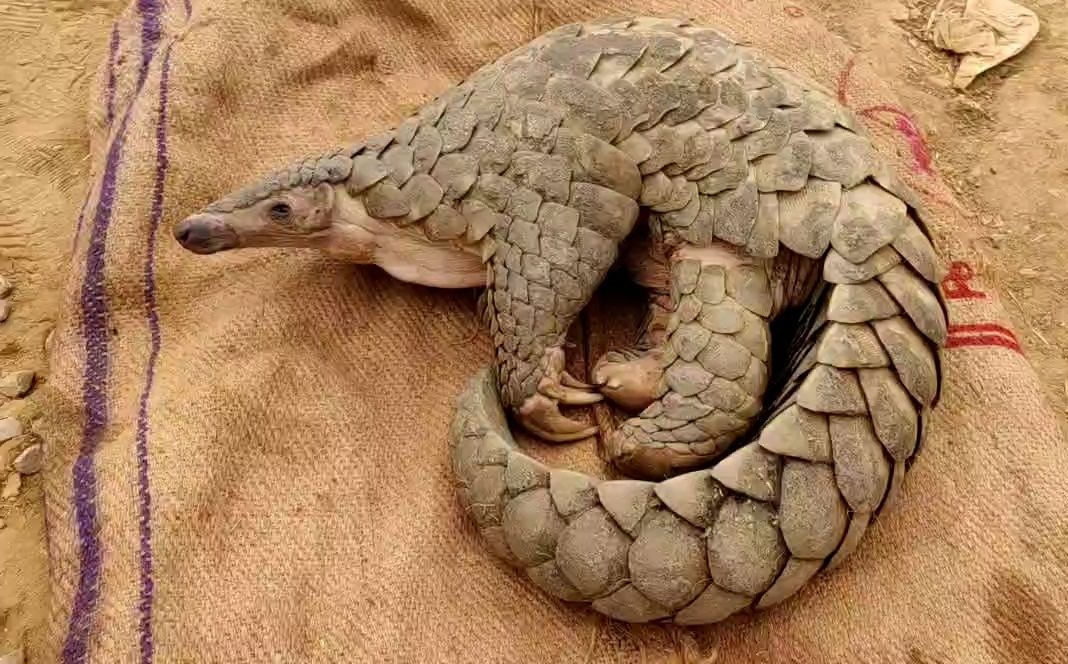Endangered Indian Pangolin Returns To The Wild
We have all felt humiliated, caged, and stressed at some point in our life. It is gut-wrenching to learn that many wild animals are put through similar conditions to satiate the demand for illegal wildlife trade. Earlier this week, WTI along with the Chhattisgarh Forest Department rescued an Indian pangolin that was bound for the illegal wildlife market, also leading to the arrest of the traders.
Pangolin is the only mammal with scales on its body. The name is derived from a Malayan word that means “rolling ball” because of its defence mechanism of rolling into a ball when threatened by a predator. The scales are similar to a shield that protect the pangolin from predator attacks. However, what rightly belongs to the pangolin for its defence is ruthlessly plucked out of its body for the high demand and value it holds in traditional Chinese medicine, Southeast Asian delicacies, and other such baseless demands.

Indian pangolin rescued from traffickers in Chhattisgarh | Photo by Chhattisgarh Forest Department
Thousands of pangolins are being killed and its scales are illegally exported from source countries such as Africa and Asia, including India, to fulfill the never-ending demand in the thriving illegal wildlife markets. The pangolin’s protective scales have become a cause of its nearing extinction, elevating its status to the world’s most trafficked mammal. India is home to two species of the animal, the Indian pangolin (Manis crassicaudata) and the Chinese pangolin (Manis pentadactyla). Pangolins are a relatively unknown and understudied species in India.
Recently, Wildlife Trust of India (WTI) came across a case of a captured pangolin, forcefully held in captivity, unsanitary conditions, to be sold in the illegal wildlife market. WTI source network, in an interior part of Chhattisgarh, provided intel about individuals who had captured a live pangolin from the wild, brutally caged it and were looking for a potential buyer to sell the animal. As is customary in the cases of pangolin trade, the traffickers recorded a short video and circulated it to attract buyers. Showing visible signs of distress and stereotypic behaviour of pacing in confined spaces, the pangolin could clearly be seen in a small plastic drum.
WTI immediately shared the intelligence and the video with the officials of the Chhattisgarh Forest Department and planned an enforcement action to save the pangolin’s life and apprehend the perpetrators. A covert agent from the enforcement agency made contact with the key trader in the trafficker’s group and spoke to him, convincing them to bring the pangolin to a mutually-decided location to conduct the trade.
On the day of the seizure, the Forest Department officials along with the local Police carried out the enforcement operation as planned and arrested a group of five traffickers. A stressed and dehydrated Indian pangolin was recovered from the trunk of the car. The intelligence sharing by WTI and the resultant quick response time (within 24 hrs) from the Forest and Police Department officials led to the successful enforcement operation that saved the life of a rare endangered Indian species and arrest of wildlife traffickers. The operation thus demonstrated the need for active synergy between civil society organizations and government agencies in abating wildlife crimes in India.
Following the standard operating procedures, the confiscated pangolin was released back to the wild after receiving medical attention. This was possible by WTI’s vigilant source network and cyber spotter network. We are thankful to the state enforcement agencies putting efforts to execute the enforcement action.
Join WTI’s cyber spotter network to help us fight illegal wildlife trade. If you come across a wildlife trade incident, DO NOT IGNORE IT; instead, Report it with immediate effect to combat the illegal wildlife trade.









